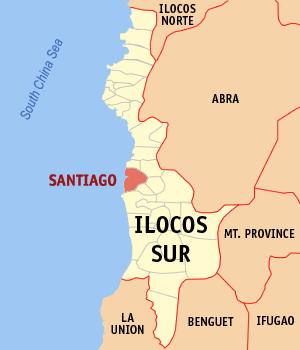Santiago, Ilocos Sur
Appearance
| Santiago | |
|---|---|
| Baley na Filipinas | |
 | |
 Lokasyon na Santiago | |
 | |
| 17°17′41″N 120°26′43″E | |
| Dalin | Filipinas |
| Barangay | 24 |
| Kaawang | |
| • Katiponan | 46.36 km2 (17.90 sq mi) |
| Elebasyon | 54 m (177 ft) |
| Bilang na too (Mayo 1, 2020)[1] | |
| • Katiponan | 19,471 |
| • Densidad | 420/km2 (1,100/sq mi) |
| Economia | |
| • Clase | kumapat ya klase ya baley |
| • Ingresos | ₱86,828,360.92 (2020) |
| • Activos | ₱1,232,195,423.05 (2020) |
| • Pasivos | ₱44,035,398.53 (2020) |
| • Gastos | ₱101,049,093.90 (2020) |
| Kodigo na postal | 2707 |
| Kodigo na lugar | 77 |
Say Santiago et kumapat ya klase ya baley ed luyag na Ilocos ed Abalaten, Filipinas. Unong ed 1 Mayo 2020 census, say populasyon to et 19,471 totoo tan 4,821 abong. Walay kabaleg tan sukat to ya 46.36 sq. km. Say zip code to et 2707.
Saray barangay
[dumaen | dumaen so pinanlapuan]- Al-aludig
- Ambucao
- San Jose (Baraoas)
- Baybayabas
- Bigbiga
- Bulbulala
- Busel-busel
- Butol
- Caburao
- Dan-ar
- Gabao
- Guinabang
- Imus
- Lang-ayan
- Mambug
- Nalasin
- Olo-olo Norte
- Olo-olo Sur
- Poblacion Norte
- Poblacion Sur
- Sabangan
- Salincub
- San Roque
- Ubbog
Demograpiko
[dumaen | dumaen so pinanlapuan]| Taon | Pop. | ±% p.a. |
|---|---|---|
| 1903 | 3,760 | — |
| 1918 | 5,429 | +2.48% |
| 1939 | 6,017 | +0.49% |
| 1948 | 6,610 | +1.05% |
| 1960 | 8,213 | +1.83% |
| 1970 | 10,224 | +2.21% |
| 1975 | 11,245 | +1.93% |
| 1980 | 11,843 | +1.04% |
| 1990 | 14,427 | +1.99% |
| 1995 | 14,843 | +0.53% |
| 2000 | 15,876 | +1.45% |
| 2007 | 16,806 | +0.79% |
| 2010 | 17,958 | +2.44% |
| 2015 | 18,759 | +0.83% |
| 2020 | 19,471 | +0.74% |
| Reperensiya: Philippine Statistics Authority[2][3][4] | ||
Saray reperensiya
[dumaen | dumaen so pinanlapuan]- ↑ "2020 Census of Population and Housing (2020 CPH) Population Counts Declared Official by the President". Hulyo 7, 2021. https://psa.gov.ph/content/2020-census-population-and-housing-2020-cph-population-counts-declared-official-president.
- ↑ Census of Population (2015). "Region I (Ilocos Region)". Total Population by Province, City, Municipality and Barangay. PSA. Retrieved 29 June 2016.
- ↑ Census of Population and Housing (2010). "Region I (Ilocos Region)". Total Population by Province, City, Municipality and Barangay. NSO. Retrieved 29 June 2016.
- ↑ Censuses of Population (1903–2007). "Region I (Ilocos Region)". Table 1. Population Enumerated in Various Censuses by Province/Highly Urbanized City: 1903 to 2007. NSO.